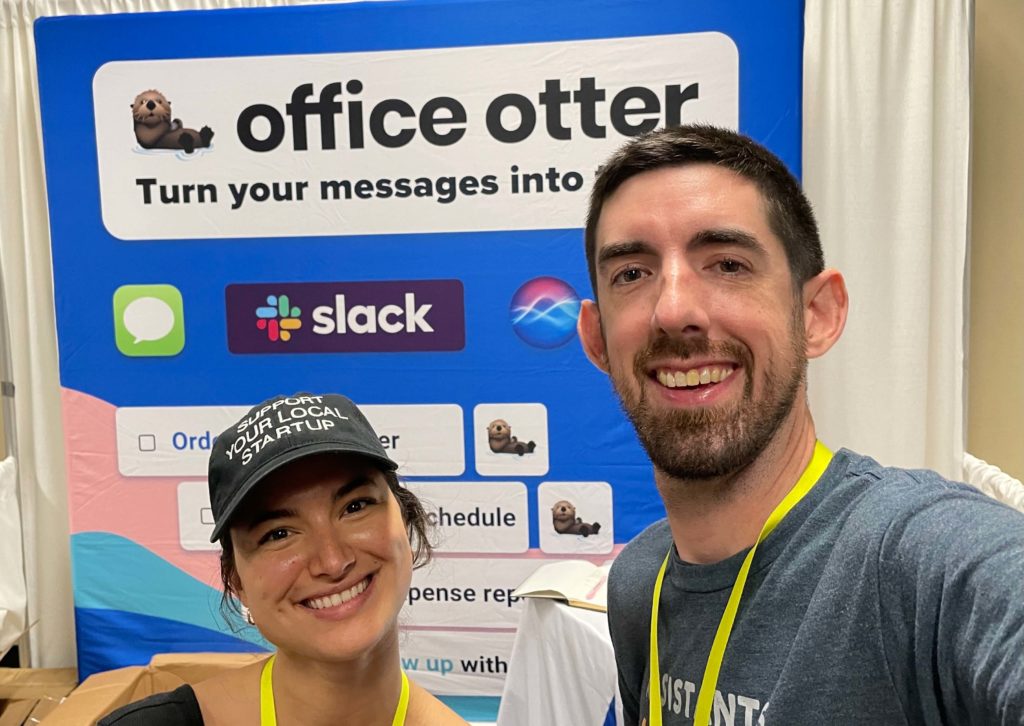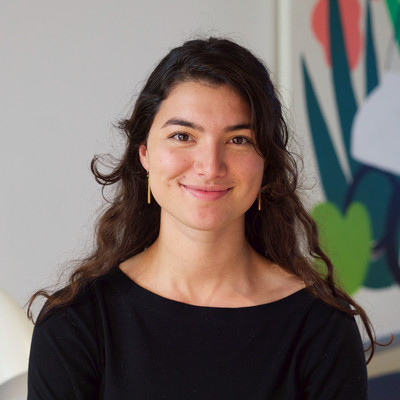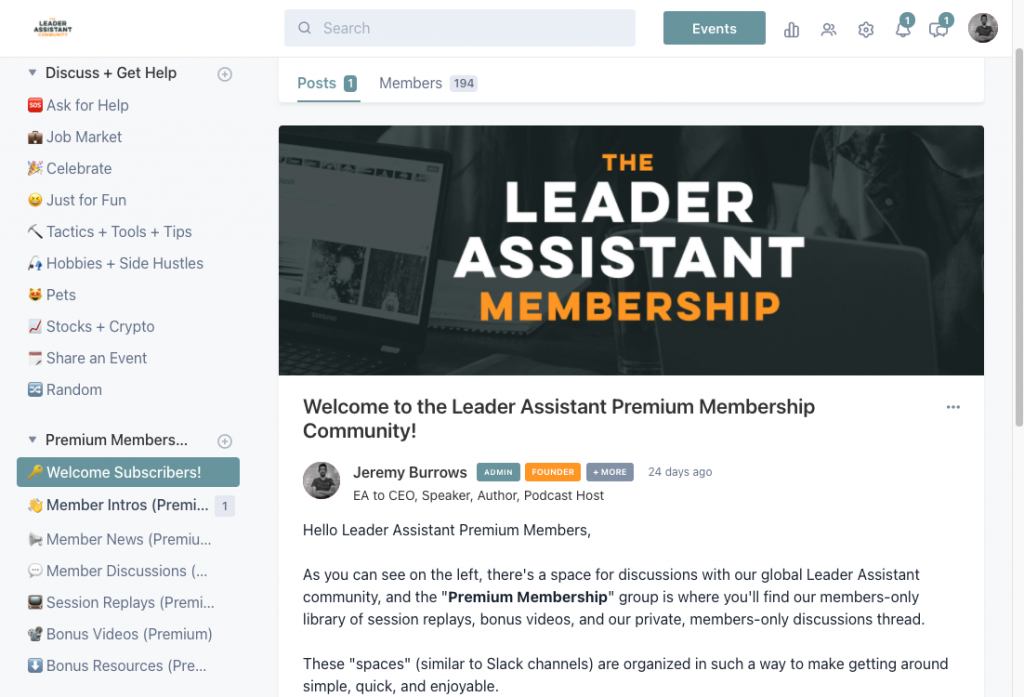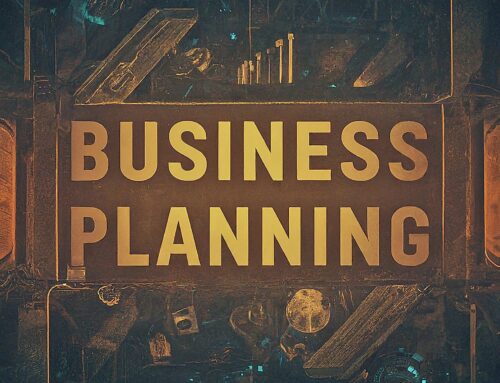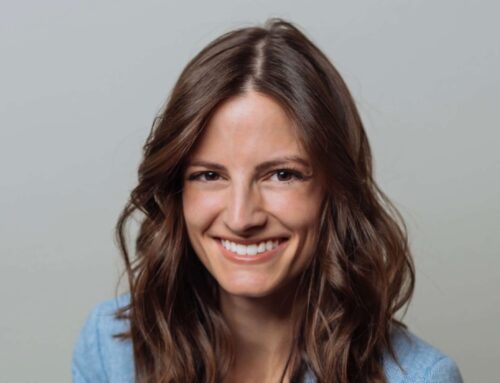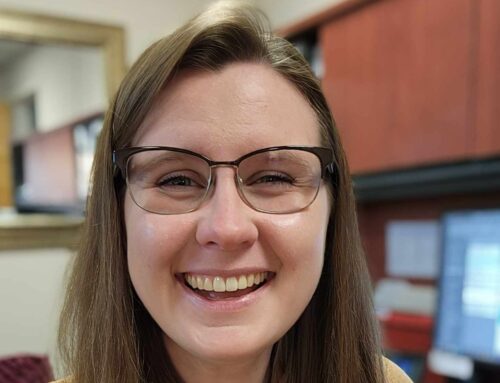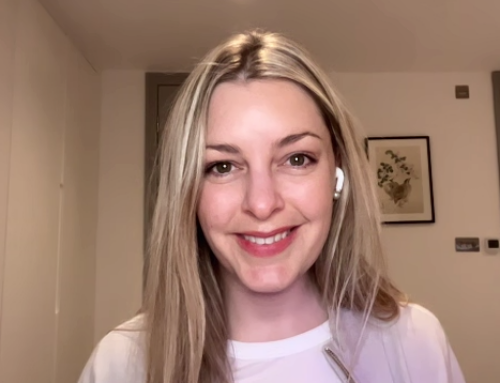Shayanne Wright is a Los Angeles based two time startup builder. Currently, she helps executive assistants manage and measure the right tasks in company operations while getting them off the craziness of Email/ Slack/ Calendar and onto the Office Otter software. This enables them to send tasks in one click, organize their task list, and get real time insights on their reports.
In this episode, Shayanne shares why she started a software company to support EAs, and how assistants can support their executives throughout the fundraising process.
And of course, be sure to turn your messages into tasks with Office Otter!
LEADERSHIP QUOTE
I would like to be remembered as someone who used whatever talent she had to do her work to the very best of her ability.
– Ruth Bader Ginsburg
CONNECT WITH SHAYANNE
ABOUT SHAYANNE
Shayanne Wright is a Los Angeles based two time startup builder. Currently, she helps Internal Operations roles (specifically Executive Assistants) manage and measure the right tasks in company operations while getting them off the craziness of Email/ Slack/ Calendar and onto the Office Otter software that enables them to send tasks in one click, organize their task list, and get real time insights on their reports.
If you want to see how Office Otter can improve savings and time in day to day operations, Shayanne would be happy to personally give you a demo. Please email her at shayanne@officeotter.com or sign up here today.
THE LEADER ASSISTANT PREMIUM MEMBERSHIP
To learn more about how you can join the now 200+ growth-minded Leader Assistants, check out our Leader Assistant Premium Membership for ongoing training, coaching, and community.
LEADER ASSISTANT LIVE EVENTS
Check out our constantly updated schedule of events for admins and assistants at LeaderAssistantLive.com.
THE LEADER ASSISTANT BOOK
Download the first 3 chapters of The Leader Assistant: Four Pillars of Game-Changing Assistant for FREE here or buy it on Amazon or Audible.
JOIN THE FREE COMMUNITY
Join the Leader Assistant Global Community here, or the Facebook Group here for bonus content and to network with other assistants who are committed to becoming leaders!
SUBSCRIBE
Subscribe to The Leader Assistant Podcast so you don’t miss new episodes!
You can find the show on Apple Podcasts, Spotify, Google Podcasts, Pandora, and Stitcher.
Join my email list here if you want to get an email when a new episode goes live.
LEAVE A REVIEW
If you’re enjoying the podcast, please take 2 minutes to rate and review the show on Apple Podcasts here. Each review helps me stay motivated to keep the show going!
—
EPISODE TRANSCRIPT
Shayanne Wright 0:00
Hi, I’m Shayanne Wright. I’m CEO and co founder of Office otter. And today’s leadership quote comes from Ruth Bader Ginsburg. When she says, I would like to be remembered as someone who used whatever talent she had to do her work to the very best of her ability.
Podcast Intro 0:19
The leader says assistant podcast exists to encourage and challenge assistants to become confident game changing leader assistants.
Jeremy Burrows 0:30
Welcome to Episode 134, of The Leader Assistant Podcast. It’s your host Jeremy Burrows. And today I’ll be speaking with the CEO and co founder of officeotter.com. So I’m excited to share that before we jump in, though, I wanted to remind you to check out our event schedule. Leaderassistantlive.com. That’s leaderAssistantlive.com to check out the schedule of upcoming events, workshops, members, coaching sessions. We’ve got a live event in San Jose in January of 2022. So we hope to see you at a future event leaderassistantlive.com. All right, I hope you enjoy episode 134 Be sure to check out the show notes at leaderassistant.com/134 Hey, friends, thanks for tuning into The Leader Assistant Podcast. It’s your host, Jeremy Burrows. And I’m very excited to be speaking with the CEO and co founder of Office otter today. And that is Shayanne Wright. Shayanne How are you?
Shayanne Wright 1:34
Hi, Jeremy. I’m doing good. Hi, everyone. Thanks for tuning in.
Jeremy Burrows 1:39
And what part of the world are you in China?
Shayanne Wright 1:43
I am in Southern California in beautiful sunny Newport Beach.
Jeremy Burrows 1:48
Very nice, very nice. Well, we’re gonna jump in and cut right to it. So let’s hear a little bit about your career. What did you do before you’re a CEO and co founder? And how did you kind of end up in the founder role?
Shayanne Wright 2:09
Yeah, I had a kind of a mix of traditional first jobs. I actually love kids. So I was a nanny for many years. And that is what got me through college. But I would say my most important role that I’ve had was my first job at a startup, I moved up to the Bay Area and worked for a small to medium business CRM software. So basically like a Salesforce competitor. And one of my biggest bragging rights is I have walked every commercial street, from Santa Cruz to Oakland in the Bay Area, literally doing door to door sales to small businesses. And actually, I loved it. It’s what made me fall in love with startups. We were working out of a condo in San Jose. So I think what I loved the most about it was that I could interact with the founder, the UX designer, the engineers, even though I was just a sales associate. So that’s kind of my background and how I fell in love with the tech world and startups specifically.
Jeremy Burrows 3:21
Nice. So tell us about your first startup that you found.
Shayanne Wright 3:26
Yes. Yeah. So this is my second startup, for everyone tuning in. My first startup was in the travel space. So that is actually how I had discovered executive assistants and how much they contribute to corporate travel and executive travel. And honestly, so that company is called left, you can still look us up at travel dash left.com. We built management software for coordinating group and business travel, we were kind of like a light way easier to use more affordable, concur. And honestly, I just loved to travel personally and became really interested in the study abroad workflow. When I was doing research for that startup, you would see you know, pen and paper and file cabinets still being used in study abroad departments across the country. And so we first wanted to digitize that process. And then very quickly, we realized travel agents. People in companies that are planning travel all had similar workflows. And so we kind of expanded to that and left grew to raise about $500,000 from investors. That’s when my co founder, Jordan joined us and it took us all around the world to work with clients and investors and partners. So even though it did Not, you know, results in an acquisition per se. It was an amazing first company to build. And I love working in the hospitality industry. So that was my first company.
Jeremy Burrows 5:13
Nice. And part of the reason that you are no longer doing that that company was COVID, correct?
Shayanne Wright 5:22
Yes, yes. So I know we all have a crazy COVID story, or we all have sacrificed something to COVID. And so my first company, we were actually as a team, we were living in Portugal when COVID hit when the travel ban went up. And we saw a very as I’m sure anyone who was working in the hospitality industry can relate to we saw a very sharp decrease in customers using our platform or paying for our platform. And so we made the difficult decision to pivot. I like to say, pivot is a nice way of saying fail and start over again. Wait and go. Yeah, and actually, that was a really hard decision, not everyone externally believed that COVID was going to have as long of an impact on the travel space as it did. And so we actually pessimistically believed that it was best to move out of the travel space, and start something completely new just for the sake of like, job security and trying to create something new. So yeah, office otter is a pivot company that was born out of the pandemic, ultimately, kind of destroying my first travel startup. But it really ended up being our silver lining of 2020. At the same time, so I can’t say that I’m not grateful for such a hard experience.
Jeremy Burrows 6:54
Okay, so obviously, a global pandemic is a challenge when running a startup, but what are some of the other challenges, or maybe even a couple of pros and cons? For as far as being a startup founder?
Shayanne Wright 7:12
Pros and cons? Um, well, it’s interesting, because I think we live in a time where being an entrepreneur and being a founder of a startup is very glamorized right now. But what I try to remind a lot of my friends and family is it’s still a job. So it’s still, even though it is my dream job, it’s so much work. And I think the hardest part is the pressure. Really, every major decision kind of boils down to you and your co founder. And when you are building a product from scratch, like how we built off a solder, literally from, you know, a couple ideas into a tangible product and how people use everyday for their jobs. At every turn, you don’t have a handbook telling you how to like, what is the next right step? What is the next right feature? Or how do you solve this problem that people are experiencing out in the real world. It’s not like if I wanted to start a mom and pop restaurant, you know, I could find so many resources on how to do that really, really well how to do that accidentally. And with startups, you’re kind of in the dark. So that’s where I’ve found like leaning on our users and really gathering their experiences has been the most helpful thing for me. The pros are, I have so much freedom, and really get to really get to put out in the world what my vision is. And I have a lot of amazing people around me that are supporting and empowering me. So I love the freedom that I get to have in like building and using my skills and the freedom to work with who I want to work with. And I get to choose how we treat people, and how we treat our users. So I would definitely say more pros than cons. And honestly, this project is the project I’m most passionate about out of all the startups I’ve worked for and on the there’s something called founder market fit. So you know, you want to have product market fit is a term used for startups, but there’s also other variables that are important, like founder market food. It’s normally someone that say wasn’t executive assistant themselves or worked for an agency in this field, but they want to build in it and for me, I feel like who I am as a person and my approach to how we built office otter has connected really well with the market that we are serving. So that is the biggest pro for me I’d say.
Jeremy Burrows 9:54
So okay, so let’s talk about the market and how How did you lean on executive assistants? And then tell us a little bit about the research that you’ve done with assistance for this startup?
Shayanne Wright 10:11
Yes, that is a great question. And I used to get that a lot from investors when we were first pivoting, because they’d be like, Wow, you’re going from a travel management software, to an executive assistant software, like how did that happen. And actually, it’s one of those funny things where you look back, and you see the writing on the walls, but in the moment, you didn’t see it, and you felt like you were wandering. So as I mentioned before, we had been exposed and did work alongside many EAS in our travel management software. And that’s, as I’m sure everyone listening knows, that’s a big primary responsibilities, especially pre COVID for these roles, and can kind of, you know, bottleneck at times. And we had actually, it’s so funny pre COVID, we had gotten a request for a Slack integration to our travel management tool, because so many of our roles were receiving travel requests via slack, and then having to manually translate those into our tool. So a big component of Office otter is this accessibility and integrations to email, text, Slack, Chrome, plugin, even Siri. And so my early curiosities about how we could be helping them outside of travel, the seeds were already planted COVID hits were a bit in the dark, actually full transparency, we did explore other ideas, you know, there’s a lot of problems to be solved in travel and hospitality. A big problem I would love to see is it’s very monopolistic. So there’s like three main players and travel, and they kind of control everything. So we kind of thought, Okay, what if we took those guys down, and created a competitive like API, we also explored like the video game industry, because that was obviously going to explode during COVID. But I kept coming back to EAS and also the like umbrella of internal operations roles. And what really drew us in and locked us in was just the willingness to share their experiences with us. So and it’s funny because I try to educate our users on this all the time, because I think it’s really interesting. A successful startup should always start with like a research initiative, whatever you want to call it, sometimes they call it customer feedback, calls discovery. And I felt that we really, if we were going to pivot and really put everything on the line for new products, we needed to make sure it was coming directly from our potential users or like the demographic who wanted to focus on and on a macro level, we knew that executive assistants were neglected from a tech perspective. So we knew that there are not enough tools platforms out there helping them automate and work on their jobs. We also knew there aren’t a lot of founders out there that feel, you know, a personal passion to, to focus on these roles. And we knew there weren’t a lot of investors investing in this. So from a macro perspective, it was kind of a good call. And then I actually, before we even picked a name before we even had any idea, you know, what is the product gonna look like? We interviewed 100, executive assistants and office managers. So those were kind of the two primary roles that we focused on. I did cold emails, so if anyone is listening in, you are in my first 100 interviews, thank you for responding to my cold email. It was the biggest, the biggest, most important thing I’ve done to build this company was starting off with that research initiative. And I did not talk about a product at all. And that entire interview is actually all about what is your job, your workflow, what tools you’re using? What is the hardest thing about your job? What is your favorite thing about your job? And so actually going into the pandemic, which and lockdowns which was, you know, one of the loneliest times for so many people, I felt really energized by these interviews and spent about two months just talking to almost entirely 100 women. And, you know, being in the tech industry, you kind of only talk to guys all the time, so I loved it, and I did not feel lonely at all. And yeah, so that’s kind of how we pivoted. I wanted to go into it really open minded and humble about the fact that I didn’t know everything. And that was the best thing I’ve done as a product builder was really letting them share with us and then looking at the macro data point, and what’s crazy is the results were very clear the data and the results of the interviews was very clear as far as like what these roles needed. Especially in such an unknown time. You know, no one really knew if they had job security at that time, so everyone was a little eager a little extra eager to share, where they think they have opportunities in their role to be better, and how they wish the tool could help them. So it was like a perfect timing thing to do 100 interviews, and, yeah, that’s how I’ve sort of kicked off. And that’s how we discovered like our three main pillars of our product. So it’s how we discovered the need for communication integrations for a centralized dashboard that can help with prioritization of your job. And then the tracking and reporting aspect of the role as well. So those three pillars were there in our our one month old prototype, and are still here today, a year after we’ve launched. And that literally came from my 100 interviews. So
Jeremy Burrows 16:05
awesome. I’m sorry. So what is the if? You know, if you meet somebody, you know, the classic elevator pitch? Give us the quick elevator? Yeah. What office otter is, and what you know what it solves for assistance?
Shayanne Wright 16:23
Yeah, so I’ve done a lot of founder training. And so it’s funny because I got told many, many times, if you are meeting someone at a bar, and they asked you what your product is, just give them the shortest version. Because founders, we think everyone wants to hear every detail of our company. And not everyone does, actually. So um, honestly, the most boiled down version is we are a inbox management, task management and performance tracking tool, specifically for internal operations roles. So in day one, we’ve the, you know, the vision did form around and executive assistant and office manager workflow. We’ve since now expanded to people ops, HR facilities and warehouse roles, we even dabble in it, we’ve got chief of staff. And that’s because the workload does translate like beyond that. But yeah, at a on a main, very boiled down level, I would say our task or our inbox management in our inbox, integrations are what really hook people. So with Office otter, we understand that specifically executive assistants, your workflow can be very scattered and very reactive slash relational. So of course, you are receiving action items via text or slack or emails. And so we what we do really well is being accessible to those communication tools. So really meeting your executive, wherever they’re messaging you. And all of those integrations in under two clicks, you can turn that existing message into a task. So not only are we accessible, but it’s very little work on the front end to centralize those action items. So that’s our, that’s our h1 on our website. It’s what converts really well in ads, honestly, it’s our text integration, I would say it’s probably our users favorite features. Because anytime you are holding that mental to do list, you are driving somewhere to go pick something up, you can send a text to your to do list and people, they say it’s a game changer, you know. So that’s kind of like the first pillar of the product, then, you know, what, how we centralize your workflow, right, so we get all into one place. And we it’s really cool, we have many, many different ways that you can custom set priorities and urgencies for your tasks. So by the time you do have the luxury of sitting down, and checking your office otter dashboard to see what’s on the table for today, your list is actually already organized by priority and urgency. So you’ve got several different buckets, and based off of the label or the executive who sent it in, or the time that it’s due, it will auto sort for you and then set it as a now task, for example. We have many beautiful, amazing task enhancements, as we call them. So you can upgrade any, you know, one off to a full on project actually. So our what a lot of people like about the product is it’s simple, but it also has a lot of potential to as far as scoping out a 10 step process, turning into a template, or sorting all of your tasks by color coordinated labels, or sharing and collaborating with another EA on scheduling board meetings, for example. So that’s kind of like the actual dashboard and experience their side notes, the product is the term is self serve. So we have no a freemium and a walkthrough. So if anybody, you know, actually wants to have a visual, as I’m talking through this, you can go to our website, office otter.com. And just sign up free. And honestly set up your to do list in like two minutes. So if I am, you know, it’s sometimes I’ve learned, it’s just easier to give your users a visual right away, rather than trying to describe it. But yeah, so that’s that kind of like the engagement, the interaction of, you know, having communications, turning them into tasks, centralizing them everything you can do with your task list. And then we have created in house over a dozen about 15, analytics and insights, specifically based on the workflow of executive assistant. So absolutely, nothing needs to be changed about your workflow and how you do the work in office otter, we already like basically glean data points from you getting your work done in our platform, and give you a downloadable, weekly, monthly, quarterly, even annual performance report that you can and has actually, given our users raises promotions, even gotten new jobs at other companies. And all of those stats are actually based around what makes an AI successful from a quantitative perspective. So that’s kind of our final pillar that I’m really proud of and speaks to the bigger vision of Office otter, which is to unlock upward mobility for internal operations roles. Yeah,
Jeremy Burrows 21:56
awesome. So yeah, definitely check out office otter.com and get a visual kind of tour of it. What, what do you think? You know, a lot of times, and I’m sure you experienced this when you’re pitching, but what tools? Do you would you say that your tool can replace? So is it Trello? Is it Asana? Is it more of like, Basecamp? You know, what, what kind of tools? Are you essentially merging into one or, you know, making better or whatever, if somebody’s listening, like, well, I already have Trello. And I can do to do lists in there? Why would I need this?
Shayanne Wright 22:42
Yeah, so tools, this is a great question. And I had to do a competitive analysis in any pitch. And we do have a competitor analysis on Office otter.com/benefits, where we break down the differences between us and other project management tools, for example. So we definitely replace pen and paper, which believe it or not, when I was doing those interviews, a lot of people still love because it’s accessible, and it’s there, and you can do it your own way. So we 100% how it can help you digitize your pen and paper process. And I will say we do replace any traditional project management tool. And I confidently believe for this demographic of users that we focus on, we are a much better fit because of our accessibility, the way we’ve designed our UX for really fast paced roles, and our reporting, of course, and just any, and then the term like for horizontal. So another thing I learned in my interviews is, you get a lot of people that are kind of using many horizontal features within their inboxes to kind of get their job done. So I was hearing a lot of like, Oh, I’ll mark emails as unread. I’ll text things to myself to remember them all you slack bot to kind of ping me in 20 minutes, we will get rid of all of that to like those mini hacks that EAS are so good at finding. We took that into consideration when we were building our product and that’s why we have the integration. So whether you have like sought out, you know, an Evernote or just a basic to do list app. Or if you’re still kind of keeping your head above water by marking things as unread, we can definitely replace that workflow in a much better way.
Jeremy Burrows 24:34
Nice. Awesome well, let’s let’s kind of transition lots of good stuff for people to explore let’s transit transition and talk about the pitching and raising money and you guys, I think you said you’ve raised $1.6 million which congrats by the way. Yeah, what you know a lot oftentimes as assistants and you know, myself included it, we’re kind of right in the middle of the capital raise, or the series B, or the series A or the series D funding rounds and trying to help our executives, you know, get more meetings, get more, you know, close more investors, what tips would you have for, you know, what did you learn in that process? And then what tips would you have for executive assistants who are project managing, and sometimes even sitting in on on meetings or trying to, you know, pitch to their friends and their network to try to get more investors?
Shayanne Wright 25:37
Yeah, oh, I love that. And for anyone listening, so there’s these terms seed. So my company, we’re at seed stage, so 1.6 million is kind of like an average amount. And then there’s Series A, B, C, A is five to 10 million BC. So Series C is amazing. You’re talking like $50 million rounds. Yeah, my so my experience fundraising for officer was really interesting, because I had fundraised for my previous company left, but it was an entirely different market. And so I had to really dive into all of the stats and the almost like the story I was going to tell with Office otter, one that I wanted to make sure to mention was, I was astounded at how large the internal operations demographic slash like part, piece of the pie of the workforce, how big it is. Fun fact. So I’m talking HR people ops, EAS, administrative roles, in general, there are 26 million of you in the US alone, which is 16% of the workforce. So collectively, you have a lot of buying power and decision making power. And there are more of you than there are salespeople or engineers. And so that was a big part of the narrative that I was pitching in light, like to investors was not only on a micro level, do you have large influence in your own company with your own executives, but on a macro level, there are a lot of you and you deserve a software that was made for you. And that is in your best interest to empower you and help you move upward in your company. So that was a really interesting, like learning curve for me was I almost had to argue from many different angles, the value that investing in these roles would have, and how everyone else is kind of missing out on this on this demographic, and is missing out on on passing by a founder who is investing in them in her own way. So yeah, and I am my goal, or 2021 was raised a million dollars. So I’m super proud that we exceeded that at 1.6. I love your question about tips for supporting executives who are fundraising. Fundraising is hard. And it’s really exhausting. And it’s really time consuming. I joke that half of fundraising is actually just sending follow up emails. So it’s one that is a perfect example of where an EA could really have a really strong positive impact on their executives fundraising experience, because so many times unfortunately, actually I like in fundraising to dating a lot. Because you know, an initial one on one, it’s kind of like a first day and then you get a lot of ghosting or it’s hard to really tell how do they feel about me? Do they like me? And so oftentimes, there are a lot of action items that can fall in the cracks if you don’t have someone helping you remember everything you committed to on the call. So things like updating due diligence documents, making sure decks are up to date, sending demos or videos, whatever they ask for really financials. That’s all a really important part of really showing up for fundraising. And then almost, you almost want to create a CRM like tool to see okay, who’s in the pipeline? Who has my executive already met with facilitating warm introductions, so even going out of your way to check? Does my executive have any LinkedIn connections with the investor that they want to pitch and trying to facilitate? How could that connection happen? That’s a really common thing with fundraising. Yeah, it’s a very tedious process. And in any way that your EA can be proactive for you and help you stay on top of those action items follow ups connections would be I’m sure all all CEOs out there would really appreciate that. And what’s great is you’re directly going to be affecting the bottom line by bringing by supporting a Series C, if you’re if you’re doing that right now, you’re literally helping your CEO create job security for the next 18 months for all of your employees. Right. Like, that is amazing. Once again, that is confirming my narrative, which is how valuable you all are. And that you you should have a tool made for you to help you track it all.
Jeremy Burrows 30:32
Yeah, I mean, I think your point about the even the email follow ups, you know, we had, I think we scheduled 300, or 400 meetings in like three months or something. When we were Yeah, Series B. And it’s like, the amount of personal emails, not mass, you know, MailChimp, server emails, but like personal emails, one by one, and then responses and follow ups and sending copies of the deck and scheduling follow up calls and all that kind of stuff. Yes, yes. You know, make sure they have the term sheet, all that kind of stuff.
Shayanne Wright 31:09
You bet. Another point you just mentioned, and it’s good that I kind of broke down, oh, look, there’s differences in your stage, and they have different names, I have had help with accumulating that list of who are our ideal investors, because the people that you guys are talking to aren’t even at my stage at all. And you actually have to do a lot of research to find, let’s say, your dream 100 investors that do invest in b2b software, or maybe they’re interested in fin tech, which is like technology for a primarily female user base, you can find investors that invest in that maybe, let’s say their average check size fits in what you’re hoping for, like even that, I could see EAS if they were if you guys are wanting to be proactive. You know, try to educate yourself on what stage your company fits in, what is the ideal term sheet is a great term to learn? Like, what are the ideal term sheet details, and then helping to build out that pipeline or like ideal leads? List? That’s something I spent a ton of time doing, and was kind of mind numbing. But
Jeremy Burrows 32:27
yeah, context? Yeah,
Shayanne Wright 32:29
like color coded and everything. So that made me think of that would have been really helpful, personally, to have help with.
Jeremy Burrows 32:39
Yeah, so Okay. Well, you said, Yeah, it’d been, it would have been helpful to have help with that. You now have an assistant though, right?
Shayanne Wright 32:48
I do. Yes. How
Jeremy Burrows 32:49
do you? How do you? Do you have tips on that working relationship, that that partnership with your assistant? And how, from your from your side, the founder, co founder, CEO, who has an assistant? What do you look for in an assistant? Do you have any tips on what’s worked well, to improve your partnership with your assistant?
Shayanne Wright 33:20
Yeah. So I’ll be gleaning from my personal experience. And also just I work on going with, you know, five 600 of our users on a monthly basis. And something that always stands out to me is when you meet a user who’s very proactive, and that’s actually one of our personal like company values with our employees is we don’t when you’re in a start up, especially in your co founder, or you know, an executive, you don’t really have time to be micromanaging. Or I’d like to think you don’t have time that I’m sure there are different preferences. But micromanaging a, any employee can end up being more work than not having an employee at all. So what I really was looking for was someone who could be proactive, and understand those foundational recurring tasks that I need to get done on a weekly or monthly or daily basis, and just take care of those. And so what we kind of do is, and this is also common in like the startup world is like a daily stand up. So it’s, it’s a very intentionally quick call to just go through what’s everything. What are your needs today or this week on top of the base level, you know, recurring processes that you do. And so, office otter plug, we use a template, a recurring templates, in office otter, and then you can add on to your checklist, you know, anything else that they need on top of that, but being proactive. I think that is just being really liable that has given me so much more peace of mind in my personal and professional life. Having that support that support person? Yeah, awesome. I’m definitely, I guess, personally,
Jeremy Burrows 35:16
let’s say, Have you made any mistakes? or had any challenges like with with utilizing your assistant? Or have you, you know, made the mad or let’s hear some cheesy?
Shayanne Wright 35:31
Um, oh gosh, okay, I and it’s not that bad. I basically had my assistant watch my Cat and Cat Suit for me. And we’re having an amp problem in my apartment that I did not warn her about. And so basically she was fending off and an army all weekend from attacking my cat food. And we kind of butted heads on that this weekend. So in and I know that that’s kind of where the lines could blur with an assistant position is I sometimes I feel like I need more help with keeping my personal life organized in my professional life. And I’m sure that that can feel frustrating, actually. Because your personal life can have so much more nuance to it, like cat food being out and ants accidentally getting into it. And then you’re both frustrated. Because answer gross. So I’m not kidding, that literally happened this weekend when I was gone. And we had to hash it out.
Jeremy Burrows 36:36
So that’s great. That’s a great point. Because a lot of assistants would hear that and say, well, that’s terrible. You’re, you know, you’re using your assistant for personal stuff. That’s not appropriate, whatever. But then there’s other assistants are like, oh, yeah, I deal with that all the time. I think yeah, my. Yeah. My question, though, is, did you when you hired your assistant, did were the expectations lined out that they would be helping with personal stuff as well?
Shayanne Wright 37:08
Yeah, so for me, yes. Because I acknowledged and actually, when I started using Office otter, I was able to see in my own personal reports, how time consuming and how tedious taking care of my personal life can be. So and that kind of how stressed out that would make me that I was having an emotional reaction to not only how much pressure my professional life is, but also how difficult it can be to balance that with all of my personal responsibility. So yes, my wonderful assistant was aware that personal responsibilities and help with my personal life would be involved, because I think that’s the type of co founder that I am, I’m kind of willing to prioritize all of my work tasks, and then genuinely, I’ll forget to grocery shop for two weeks. So I that’s just where I personally saw the need for support.
Jeremy Burrows 38:08
Yeah, that makes sense.
Shayanne Wright 38:11
Yeah. So I guess, executive to executive or like co founder, if any co founders of startups are listening in, I think it’s okay to, you know, admit that you need help in your personal life. And you can’t be the best co founder you can be if your personal life is getting neglected. So if you can find someone who is willing to take on those responsibilities, it can make a really big difference. And I it makes me even more grateful. For my assistant. Yeah.
Jeremy Burrows 38:48
And I’ve always, I’ve always done personal and professional support for my executives. And I yeah, I personally like that just because they only have one life. And if I try to segment it like crazy, then it’s hard for me to really be be a leader assistant, to a founder, CEO type, which is primarily supported in my career. So awesome. Well, let’s, let’s just wrap it up. It’s been a great conversation. Thank you so much for sharing your story. And why don’t you just give us a quick? How can we find out about you and how can people reach out if they want to connect and learn more about you and your company?
Speaker 1 39:34
Yes, yeah. Thank you for listening, everyone for listening. So I’d say moving forward. If you are interested in all in using Office otter, I mentioned before you can sign up at officeotter.com. We have self serve and is completely free to use. And we have a very inclusive feedback process. So if you are someone who prides yourself on giving really good feedback or being very picky, please reach out to me. Actually, if you find our website or our product and you see a little chat bubble on the bottom right hand that goes straight to my slack. So my email is Shayanne@officeotter.com, please feel free to email me directly, or you can actually chat me on the product or on the website. And I would love to give you I like to call it I’d love to give you a VIP onboarding or consultation call. And let’s see, I’d love to hear about your workflow and see how we can fit the product best to your workflow flow, or we can brainstorm on how to make office are better in the future. And that is really what I love the most about my job. So yeah, that is, oh, oh, I’m gonna add a little thing too. If you not only are interested in getting more organized, centralizing your communications on a day to day basis, but also if you’re interested in applying quantitative and qualitative analytics to your performance, that’s really where I think office otter can help you the most. And hopefully, we can help you achieve that upward mobility and any milestones that you’re hoping to achieve as a leader assistance in the future. And that’s where I would say office auditor can kind of help you the most. So yeah,
Jeremy Burrows 41:29
awesome. Yeah. And I think it’s great to have some analytics that you can printout or, or download and share it with your executive for for your performance reviews, and for that business case that you’re putting together to get a get a raise or a title change. And so yeah, that’s great that you guys, I
Shayanne Wright 41:47
like to say it’s, it’s like the language that executives speak is analytics. So in essence, you’re just translating your to do list into a format that will resonate with them.
Jeremy Burrows 42:01
Awesome. Well, thanks again, Cheyenne. Best of luck to you and the office otter team. And we look forward to following your story and your startup story. And I look forward to the day when you’re no longer a startup and you’re just a large booming business.
Shayanne Wright 42:18
Yes, thank you. Yeah, everyone. buy stocks in our IPO one day.
Jeremy Burrows 42:25
There you go. All right. Well, thanks again. Have a great one. And thanks for being on the show. And we’ll talk soon.
Shayanne Wright 42:32
You too. Bye, everyone.
Jeremy Burrows 42:34
Thanks again, Cheyenne. Check out the show notes at leaderassistant.com/134 so you can connect with her and check out officeotter.com to check out their product. And we’ll talk to you soon have a good one.
You on Apple podcast. Goburrows.com

